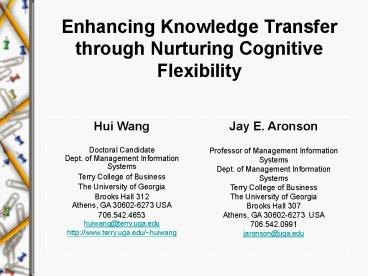Enhancing Knowledge Transfer through Nurturing Cognitive Flexibility - PowerPoint PPT Presentation
1 / 28
Title:
Enhancing Knowledge Transfer through Nurturing Cognitive Flexibility
Description:
Enhancing Knowledge Transfer through Nurturing Cognitive Flexibility. Jay E. Aronson ... How do we know if a knowledge management system (KMS) is effective? ... – PowerPoint PPT presentation
Number of Views:109
Avg rating:3.0/5.0
Title: Enhancing Knowledge Transfer through Nurturing Cognitive Flexibility
1
Enhancing Knowledge Transfer through Nurturing
Cognitive Flexibility
2
- Hui Wang
- Doctoral CandidateDepartment of Management
Information Systems - Terry College of Business
- The University of GeorgiaAthens, GA 30602-6273
- Phone 706-542-4653E-mail huiwang_at_terry.uga.edu
- Homepage http//www.terry.uga.edu/huiwang
3
Outline
- Research Question
- Theory Basis and Definitions
- Conceptual Model and Propositions
4
How to use cognitive flexibility to make
knowledge transfer more effective.
5
Effective KMS
- How do we know if a knowledge management system
(KMS) is effective? - How do we know the knowledge in the KMS is being
used effectively? - How do we know the knowledge is being used as
effectively as it can be?
6
Knowledge Transfer
- Knowledge Transfer (KT) the adoption of
knowledge from its original problem-solving
context to a new context, and the adaptation of
the knowledge to create a solution under the new
conditions.
7
Research Questions
- What individual cognitive factors lead to
effective KT? - How should knowledge in a KMS be documented and
presented to nurture these factors?
8
An Example Go to Excel Worksheet Cell AA145
9
Cognitive Flexibility
- Learn one way, you know one way, and may not
completely understand the general concept of
worksheet navigation. - Learn multiple ways
- You learn to apply the different methods under
different conditions - You also learn the general concept of worksheet
navigation. - The second way is cognitively more flexible.
10
Cognitive Flexibility
- Cognitive Flexibility The ability to
spontaneously restructure ones knowledge in
adaptive response to changing situational demands
(Spiro and Jehng 1990) .
11
Proposition 1
- Ceteris paribus, higher CF leads to better KT
performance.
Cognitive Flexibility
Knowledge Transfer
P1
12
Cognitive Flexibility Theory (Spiro et al. 1987)
- (1) learning activities must provide multiple
representations of content - (2) instructional materials should avoid
oversimplifying the content domain and support
context-dependent knowledge - (3) instruction should be case-based and
emphasize knowledge construction, not
transmission of information - (4) knowledge sources should be highly
interconnected rather than compartmentalized.
13
- Thought flows in terms of stories - stories about
events, stories about people, and stories about
intentions and achievements. The best teachers
are the best story tellers. We learn in the form
of stories. - Frank Smith
14
Bostrom, Olfman, and Sein (1990) Framework for
End-user Training
15
Definitions
16
Learning Methods
P2
P3
Learning Style
Knowledge Transfer
Cognitive Flexibility
P1
P4
P5
Cognitive Style
General Intelligence
Conceptual Model of Improving Knowledge Transfer
17
Proposition 2
- Ceteris paribus, training methods that emphasize
Concrete Experience (CE) and Active
Experimentation (AE) leads to higher level of CF
than those emphasizing Abstract Conceptualization
(AC) and Reflective Observation (RO).
18
Proposition 2
- Higher levels of active learning methods lead to
higher level of CF.
Learning Methods
P2
Knowledge Transfer
Cognitive Flexibility
P1
19
Experiential Learning Theory (Kolb 1984)
20
Learning Theory Types
21
Proposition 3
- When the training method emphasizes Concrete
Experience and Active Experimentation,
individuals with a learning style that favors
Concrete Experience and Active Experimentation
(Accommodators) are likely to develop higher CF
than people with other learning styles.
22
Proposition 3
- If the individuals learning style matches the
active learning methods, the CF is higher.
Learning Methods
P2
P3
Learning Style
Cognitive Flexibility
23
Cognitive Style
- The adaption-innovation theory (Kirton 1976)
identifies two extreme cognitive styles
manifested in creativity, problem-solving, and
decision-making the habitual adaptor and
habitual innovator.
24
Proposition 4
- Individuals with a cognitive style that is
characterized as habitual innovator on average
develop higher CF than those with a cognitive
style characterized as habitual adaptor when
training methods that emphasize CE and AE are
used, the differences in CF between habitual
innovators and habitual adaptors are smaller than
when training methods that emphasize AC and RO
are used.
25
Proposition 4
- Habitual innovators tend to have higher CF than
habitual adaptors. Higher levels of active
learning reduce CF differences between them.
Learning Methods
P2
P3
Learning Style
Cognitive Flexibility
P4
Cognitive Style
26
Proposition 5
- Individuals with a high level general
intelligence on average develop higher CF with
respect to the learning target than those with a
lower level general intelligence when training
methods that emphasize CE and AE are used, the
differences in CF between those with high general
intelligence and those with lower general
intelligence are smaller than when training
methods that emphasize AC and RO are used.
27
Proposition 5
- Smarter people tend to have higher CF. Active
learning methods reduce CF differences between
them.
Learning Methods
P2
P4
Cognitive Flexibility
Cognitive Style
P5
General Intelligence
28
Anything else?
Thank You!































